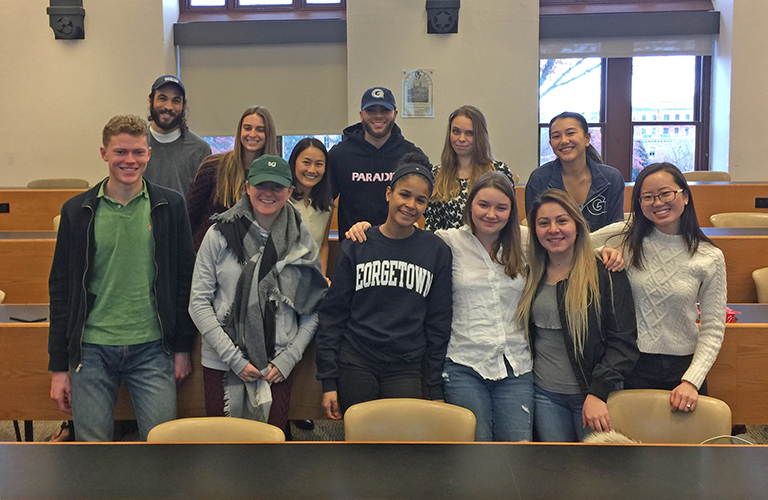Hsu Tackles Question of Happiness in China
Professor Becky Hsu (back row, third from left) with her seminar class on happiness studies. (Photo courtesy Becky Hsu)
January 30, 2019 — What does it mean to be happy?
The question has challenged everyone from philosophers to economists over centuries of human thought, and the answer inevitably varies across time and cultures. One Georgetown College sociology professor is helping bridge that gap with a comprehensive analysis of happiness in China.
Professor Becky Hsu led a multi-institutional research project into happiness in China, which inspired her own book, Happiness in China: Family, Fate, and the Good Death, available later this year from the University of Chicago Press.
A TEAM APPROACH
Hsu was inspired to study happiness by Habits of the Heart, an influential 1985 sociology text on civil society, religion, and the ways Americans think about living a full and meaningful life.
“I was reading the first chapter, which has a lot about how Americans think about happiness,” Hsu said. “I was reading it, loved it, and started thinking ‘I kind of want to try something like this in China.’”
She assembled a team of sociologists from Georgetown, Yale University, and Kenyon College to mirror the five-person team assembled by Habits of the Heart editor Robert N. Bellah. After securing a grant from the John Templeton Foundation in 2013, the team carried out three years of qualitative and quantitative fieldwork to determine what constitutes a good life in China.
The team’s grant proposal, titled “The Concept of Fu in Contemporary China: Searching for Well-Being, Purpose, and the Good Life,” featured each researcher analyzing happiness through a different component of Chinese life.
Hsu picked funerals.
“I know, I’m the weird one, right?” Hsu said. “But I really thought it would be interesting — one way to see how people think about a good life is seeing what they think a good death is.”
TRADITIONAL VALUES AND AGING
Hsu spun off her portion of the research project into her own book, Happiness in China: Family, Fate, and the Good Death.
She suggests that even in the face of globalization and a booming economy, the family values that have underpinned Chinese society for centuries are still held in high esteem.
When asked about their happiness, Hsu’s Chinese subjects tended to talk about families much more than themselves — especially in comparison to the often-individualistic perspective on happiness as discussed in the United States.
“We’d ask a college student in China why she said their roommate was happy, and she would say, ‘Oh, well she has such a good relationship with her parents and grandparents.’ Family is important here too, but you wouldn’t hear that answer,” Hsu said.
Chinese respondents were also much more likely to see happiness as something bestowed, acknowledge the role of luck in their successes, and to go to fortune tellers in an effort to understand — or change — their fate.
“It’s less of a pursuit of happiness, something you have to go and get,” Hsu said. “They talk about happiness in more mixed terms — ‘I did stuff, but also, I was lucky.’”
Hsu’s research on old age and death from the Templeton-funded project also features heavily in her new book. She portrays older Chinese citizens as comfortable with death. In a 2016 video featured in the Washington Post, Hsu speaks with a woman actively excited to show off her burial outfit.
“People feel like if they’ve had a good life, they’re proud of it, they can be prepared for their funeral,” Hsu said. “Their view of death is very social — not just at a party, but with people visiting graves at least once a year. It takes away some of the forlorn quality of it.”
BRINGING LESSONS HOME
Hsu gave a well-received lecture on her research last week as part of the “China’s New Era” speaker series, co-hosted by the Initiative for U.S.-China Dialogue and the Asian Studies Program at the Walsh School of Foreign Service.
She also created and taught an advanced seminar last semester on “happiness studies,” which arose directly from her research in China.
The class was structured around the grant application process, with students developing innovative proposals for measuring happiness, both domestically and around the world. The class received rave reviews, and Hsu believes it’s important for Georgetown students to think critically about what it means to be happy.
“There’s this thing I call ‘happiness anxiety’ — the pressure to be happy, to see happiness as a mark of success,” Hsu said. “We talked in class about how everyone feels this, and I think it’s important to recognize that it’s OK to not be happy all the time. And I think naming it helps to dispel it.”
